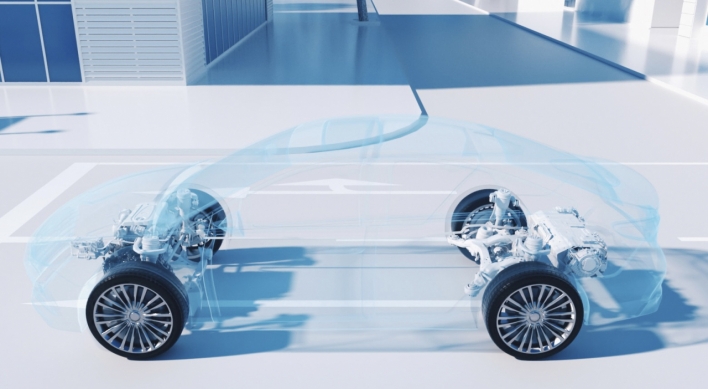[SUPER RICH] Shinsegae heir’s very public love affair with Tesla
By Korea HeraldPublished : March 24, 2014 - 21:46

 Chung, son of Shinsegae chairwoman Lee Myung-hee and nephew of Samsung Group Chairman Lee Kun-hee, became the first individual to own a Tesla vehicle in Korea. Hyundai and Kia reportedly own two cars for research purposes.
Chung, son of Shinsegae chairwoman Lee Myung-hee and nephew of Samsung Group Chairman Lee Kun-hee, became the first individual to own a Tesla vehicle in Korea. Hyundai and Kia reportedly own two cars for research purposes. The Tesla Model S is known to cost well over 100 million won ($92,700), equipped with an 85 kWh lithium-ion battery pack that can be driven 426 km per charge. Its energy consumption is rated at 237.5 watt-hours per kilometer for a combined fuel economy of 2.64 liter per 100 kilometers.
Chung is a well-known automobile enthusiast. His garage holds an assortment of high-end cars including a Mercedes Benz, BMW 760i and Ferrari. Tesla’s Model S was the latest addition to his collection.
Chung reportedly bought the electronic vehicle directly from a U.S. vendor because the brand has yet to launch in Korea.
For convenience’s sake, the 45-year-old has installed a fast-battery charging system at his home in Pangyo-dong, Seongnam, Gyeonggi Province.
Now, it looks like Chung’s purchase was more than a simple shopping spree.
E-mart, the discount chain owned by Shinsegae, on March 13 announced that about 100 of its outlets across the country would be facilitated with electronic vehicle battery charging stations by 2015.
Currently, a total of 10 E-marts, including one in Seongsu-dong, Seoul, have EV chargers. Shinsegae Department Store was also considering adopting the system, sources said.
Charging stations have already become a huge trend in the U.S., where Wal-Mart, Walgreen and other retailers are vying to install them to attract environmentally conscious customers.
An average EV needs 3-4 hours to fully recharge, which means that people need to spend a long period of time somewhere while their cars are charging and it is natural that many want to shop during the waiting time, experts say.
Currently, on Jejudo Island ― an area that’s serving as the government’s main arm for promoting electronic vehicles ― chargers are installed at large shopping malls and tourist attractions.
“It was a smart move for Chung to pick EV chargers. The industry is still in a budding stage, but given the government subsidies, it will surely become the next big thing in autos,” an EV industry insider said.
By Bae Ji-sook (baejisook@heraldcorp.com)
-
Articles by Korea Herald









![[Kim Seong-kon] Democracy and the future of South Korea](http://res.heraldm.com/phpwas/restmb_idxmake.php?idx=644&simg=/content/image/2024/04/16/20240416050802_0.jpg&u=)










![[Today’s K-pop] Zico drops snippet of collaboration with Jennie](http://res.heraldm.com/phpwas/restmb_idxmake.php?idx=642&simg=/content/image/2024/04/18/20240418050702_0.jpg&u=)